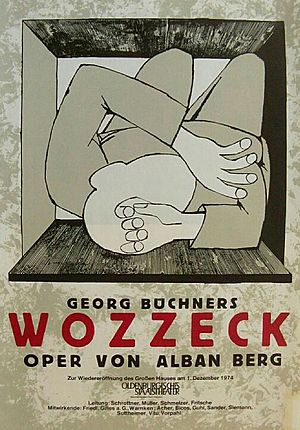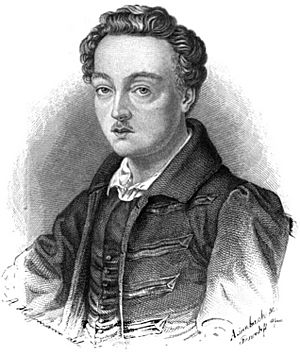Wozzeck facts for kids
Quick facts for kids Wozzeck |
|
|---|---|
| by Alban Berg | |

1974 poster of Oldenburgisches Staatstheater
|
|
| Librettist | Berg |
| Language | German |
| Premiere | 14 December 1925: Berlin State Opera |
Wozzeck is the first opera by the Austrian composer Alban Berg. It was composed between 1914 and 1922 and first performed in 1925. The opera is based on the drama Woyzeck, which the German playwright Georg Büchner left incomplete at his death. Berg attended the first production in Vienna of Büchner's play on 5 May 1914, and knew at once that he wanted to base an opera on it. (At the time, the play was still known as Wozzeck, due to an incorrect transcription by Karl Emil Franzos, who was working from a barely-legible manuscript; the correct title would not emerge until 1921.) From the fragments of unordered scenes left by Büchner, Berg selected 15 to form a compact structure of three acts with five scenes each. He adapted the libretto himself, retaining "the essential character of the play, with its many short scenes, its abrupt and sometimes brutal language, and its stark, if haunted, realism..."
The plot depicts the everyday lives of soldiers and the townspeople of a rural German-speaking town. Prominent themes of militarism, callousness, social exploitation are brutally and uncompromisingly presented. Toward the end of act 1, scene 2, the title character (Wozzeck) murmurs, "Still, all is still, as if the world died," with his fellow soldier Andres muttering, "Night! We must get back!" seemingly oblivious to Wozzeck's words. A funeral march begins, only to transform into the upbeat song of the military marching band in the next scene. Musicologist Glenn Watkins considers this "as vivid a projection of impending world doom as any to come out of the Great War."
Contents
Composition history

Berg began work on the opera in 1914, but was delayed by the start of World War I and able to devote time to finishing it only while on leave from his regiment in 1917 and 1918. His experience of the war had a pronounced impact on Wozzeck. In a June 1918 letter to his wife, he wrote, "There is a little bit of me in his character, since I have been spending these war years just as dependent on people I hate, have been in chains, sick, captive, resigned, in fact, humiliated." His correspondence and notebooks dating from the war years reveal a painful obsession with completing Wozzeck.
Compositional sketches and notes for both Wozzeck and the Marsch from Three Pieces for Orchestra that Berg made during the war are strewn with disjointed fragments of military ordinances and terminology. In a draft page of the act 1, scene 2 libretto, Berg included notations in the dialogue that refer to Austrian army bugle calls. These military signals were later inserted into the score in a modified, slightly atonal form, but were still likely recognizable to Austrian audiences of the period. The scene of snoring soldiers in the barracks during act 2, scene 5 was influenced by Berg's similar such experience: "this polyphonic breathing, gasping, and groaning is the most peculiar chorus I've ever heard. It is like some primeval music that wells up from the abysses of the soul ..."
In 1916, Berg devoted himself to attaining the rank of Einjährig-Freiwillige Korporal (Corporal), which he did later that year. During this period, as he wrote to his wife, "For months I haven't done any work on Wozzeck. Everything suffocated. Buried!" Finishing act 1 by the summer of 1919, act 2 in August 1921, and the final act during the following two months (with orchestration finalized over the following six months), Berg completed Wozzeck in April 1922. For the climactic section, he used one of his old student pieces in D minor.
Performance history
Erich Kleiber, "who programmed (the opera) on his own initiative", conducted the world premiere at the Berlin State Opera on 14 December 1925. Walsh claims that it was "a succès de scandale with disturbances during the performance and a mixed press afterwards, but it led to a stream of productions in Germany and Austria, before the Nazis consigned it to the dustbin of 'degenerate art' after 1933". Initially, Wozzeck established a solid place for itself in the mainstream operatic tradition and quickly became so well-established in the repertoire of the major European opera houses that Berg found himself able to live a comfortable life off the royalties. He spent a good deal of his time through the 1920s and 30s travelling to attend performances and to give talks about the opera.
The Philadelphia Grand Opera Company gave Wozzeck's American premiere on 19 March 1931 at the Philadelphia Metropolitan Opera House, with Leopold Stokowski conducting.
Arnold Schoenberg's former pupil, the conductor and BBC programme planner Edward Clark, produced a broadcast of fragments of the work in a studio concert on 13 May 1932, with the BBC Symphony Orchestra under Sir Henry Wood. On 14 March 1934 in the Queen's Hall, Adrian Boult conducted a complete concert performance of Wozzeck, again produced by Edward Clark. The opera was given its first British staged performance at the Royal Opera House, Covent Garden, on 22 January 1952.
A typical performance of the work takes slightly over an hour and a half.
Musical style and structure
Wozzeck is generally regarded as the first opera produced in the 20th-century avant-garde style and is also one of the most famous examples of atonality (music that avoids establishing a key) and Sprechgesang. Berg was following in the footsteps of his teacher, Schoenberg, by using free atonality to express emotions and even the thought processes of the characters on the stage. The expression of madness and alienation was amplified with atonal music.
The music is atonal: it does not follow the techniques of the major/minor tonality system dominant in the West during the Baroque, Classical, and Romantic periods. It uses other methods of controlling pitch to direct the harmony; the tritone B–F, for example, represents Wozzeck and Marie, permanently in a struggle with one another. The combination of B♭ and D♭ (a minor third) represents the link between Marie and the child. In this way, the opera continually returns to certain pitches to mark crucial moments in the plot. This is not the same as a key center, but over time the repetition of these pitches establishes continuity and structure.
Instrumentation
Wozzeck uses a fairly large orchestra and has three onstage ensembles in addition to the pit orchestra (a marching band in act 1, scene 3; a chamber orchestra in act 2, scene 3; and a tavern band in act 2, scene 4; an upright piano is also played in act 3, scene 3). The instrumentation is:
Pit orchestra
|
|
Special groups
Marching band (Act I, scene iii):
|
|
|
Berg notes that marching band members may be taken from the pit orchestra, indicating exactly where the players can leave with a footnote near the end of Act I, scene ii.
Tavern band (Act II, scene iv):
|
|
In addition, for the Tavern scene in Act III, scene iii, Berg calls for an out-of-tune upright piano.
Chamber orchestra (Act II, scene iii):
|
|
The instrumentation matches that of Schoenberg's Chamber Symphony No. 1.
Other versions of Wozzeck
There are several different versions of Wozzeck in the opera repertoire apart from Berg's. German composer Manfred Gurlitt's Wozzeck, also based on Büchner's play, was first performed four months after Berg's work. Gurlitt's Wozzeck, which was created without any knowledge of Berg's, has remained in its shadow.
Arrangements of Berg's setting include one for 22 singers and 21 instrumental parts by Canadian composer John Rea and one for a reduced orchestra of about 60 players for smaller theatres by composer and fellow Schoenberg student Erwin Stein in collaboration with Berg.
Recordings
- Roman Trekel (Wozzeck), Anne Schwanewilms (Marie), Gordon Gietz (Tambourmajor), Nathan Berg (Doktor), Robert McPherson (Andres), Marc Molomot (Hauptmann), Katherine Ciesinski (Margret), Houston Grand Opera Children's Chorus, Chorus of Students and Alumni, Shepherd School of Music, Rice University, Houston Symphony, conducted by Hans Graf. Label: Naxos, 2017.
- Franz Hawlata (Wozzeck), Angela Denoke (Marie), Reiner Goldberg (Tambourmajor), Johann Tilli (Doktor), Hubert Delamboye (Hauptmann), Vivian Tierney (Margret), Vivaldi Chorus; IPSI; Petits Cantors de Catalunya; Orchestra & Chorus of the Gran Teatre del Liceu, conducted by Sebastian Weigle, directed by Calixto Bieito. Label: Opus Arte, 2006.
- Franz Grundheber (Wozzeck), Waltraud Meier (Marie), Mark Baker (Tambourmajor), Endrik Wottrich (Andres), Graham Clark (Hauptmann), Günter von Kannen (Doktor), Dalia Schaechter (Margret), Chorus and Children's Choir of the Deutsche Oper Berlin, Staatskapelle Berlin, conducted by Daniel Barenboim, Label: Teldec, 1994.
- Franz Grundheber (Wozzeck), Hildegard Behrens (Marie), Walter Raffeiner (Tambourmajor), Philip Langridge (Andres), Heinz Zednik (Hauptmann), Aage Haugland (Doktor), Anna Gonda (Margret), Wiener Staatsopernchor, Vienna Philharmonic, conducted by Claudio Abbado, Label: Deutsche Grammophon, 1987.
- Eberhard Waechter (Wozzeck), Anja Silja (Marie), Hermann Winkler (Tambourmajor), Horst Laubenthal (Andres), Heinz Zednik (Hauptmann), Alexander Malta (Doktor), Gertrude Jahn (Margret), Wiener Staatsopernchor, Vienna Philharmonic, conducted by Christoph von Dohnányi, Label: Decca, 1979.
- Toni Blankenheim (Wozzeck), Sena Jurinac (Marie), Richard Cassilly (Tambourmajor), Peter Haage (Andres), Gerhard Unger (Hauptmann), Hans Sotin (Doktor), Elisabeth Steiner (Margret), Chorus of the Hamburg State Opera, Hamburg Philharmonic State Orchestra, conducted by Bruno Maderna, directed by Rolf Liebermann, Label: Arthaus Musik, 1970.
- Walter Berry (Wozzeck), Isabel Strauss (Marie), Fritz Uhl (Tambourmajor), Richard van Vrooman (Andres), Albert Weikenmeier (Hauptmann), Karl Dönch (Doktor), Ingeborg Lasser (Margret), Chorus and Orchestra of the Paris Opera, conducted by Pierre Boulez, Label: Columbia, 1966.
- Dietrich Fischer-Dieskau (Wozzeck), Evelyn Lear (Marie), Helmut Melchert (Tambourmajor), Fritz Wunderlich (Andres), Gerhard Stolze (Hauptmann), Karl-Christian Kohn (Doktor), Alice Oelke (Margret), Chorus and Orchestra of the Deutsche Oper Berlin, conducted by Karl Böhm, Label: Deutsche Grammophon, 1965.
- Tito Gobbi (Wozzeck), Dorothy Dow (Marie), Mirto Picchi (Tambourmajor), Italo Tajo (Doktor), Petre Munteanu (Andres), Hugues Cuénod (Hauptmann), Maria Teresa Mandalari (Margret), RAI Chorus and Symphony Orchestra of Rome, conducted by Nino Sanzogno, Label: /RAI/Myto, 1955 (sung in Italian).
- Mack Harrell (Wozzeck), Eileen Farrell (Marie), Frederick Jagel (Tambourmajor), David Lloyd (Andres), Joseph Mordino (Hauptmann, Soldat, Idiot), Ralph Herbert (Doktor), Edwina Eustis (Margret), New York Philharmonic, conducted by Dimitri Mitropoulos, Label: Columbia (FCX 157–FCX 158), 1951.
Film adaptation
The 1970 Hamburg State Opera production was filmed for the 1972 TV film Wozzeck, directed by Joachim Hess and broadcast on Norddeutscher Rundfunk. Filming was done in and around a deserted castle.
See also
 In Spanish: Wozzeck (Berg) para niños
In Spanish: Wozzeck (Berg) para niños

